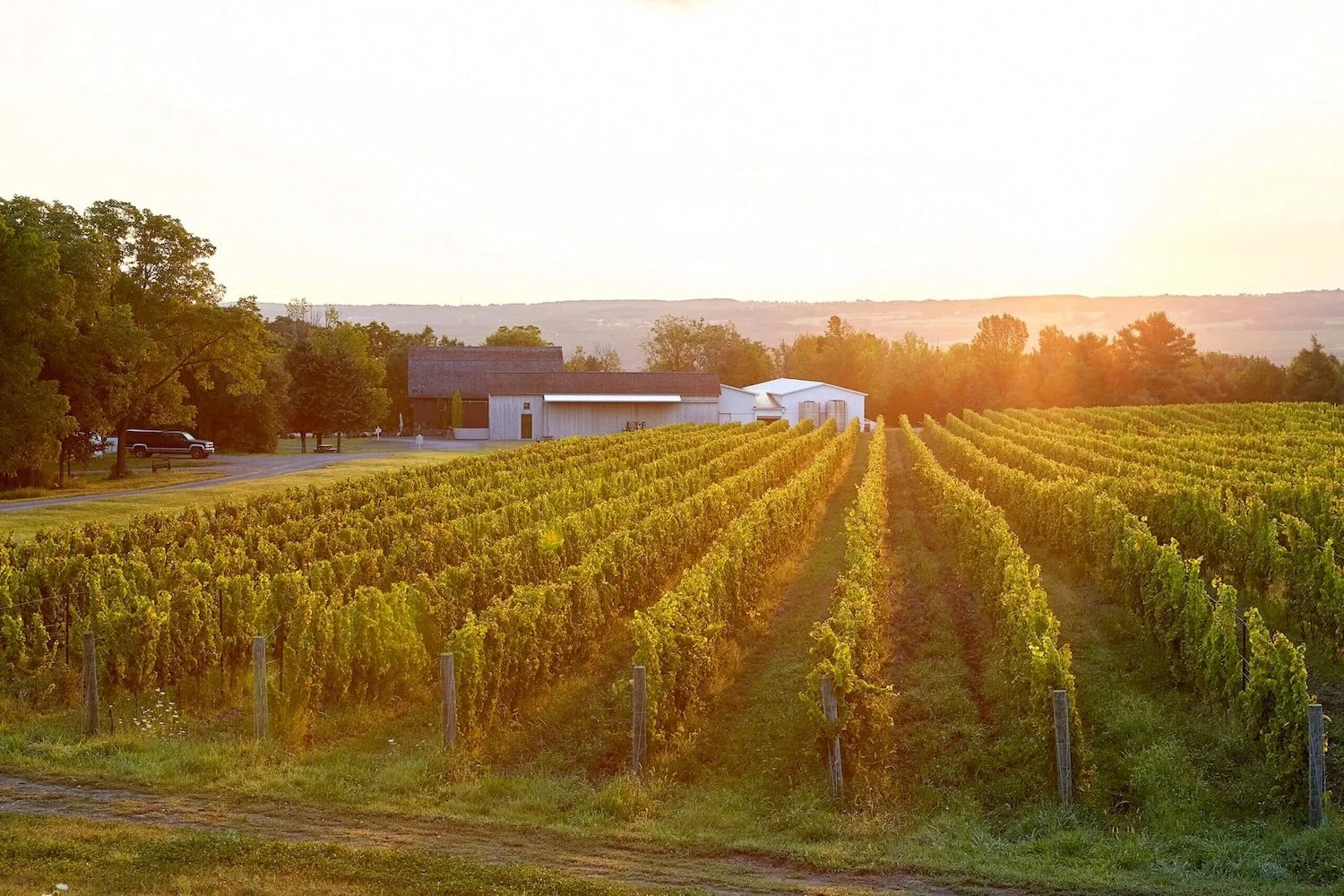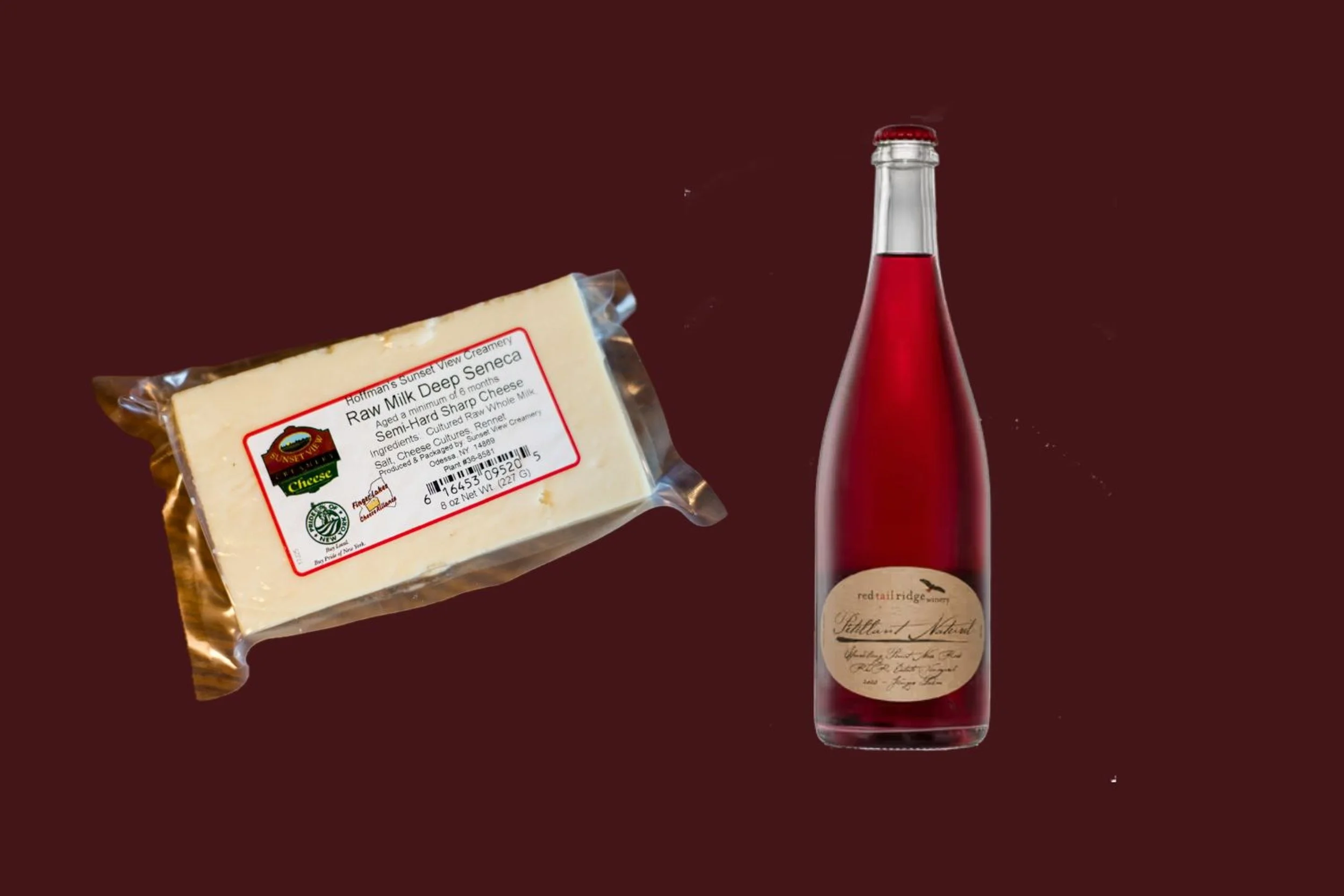5 Finger Lakes Wine & Cheese Pairings Worth the Drive
Skaneateles Lake photo credit Colin Redwood
Upstate New York is a wine and cheese lover’s paradise and has been producing some of the best wine and cheese in the United States for quite some time. Cheesemaking dates back to the 1800s, when early Swiss and Dutch settlers brought their recipes and practices to New York. By the mid-19th century, New York State had earned the reputation of making superb artisan cheeses thanks to the countless small family farms carrying on their traditions.
Wine production has been in the Finger Lakes for just as long, dating back to 1829 when Reverend William Bostwick planted the region’s first vineyards in the rectory garden in Hammondsport.
Finger Lakes Wine Region
The Finger Lakes benefit from having a climate and soil composition similar to some of Europe’s best wine-growing regions, notably the Rhine River in Germany. Unsurprisingly, grape varieties grown there also succeed in New York, especially Riesling, the most widely planted wine grape. More than 100 other American and European hybrid grapes are grown as well.
In recent decades, there has been an explosion in wines produced from grapes native to the Republic of Georgia, especially rkatsiteli and saperavi. These varieties, and others, yield sophisticated and delicious wines of all styles.
Boston-based wine educator Erika Frey is intimately familiar with the Finger Lakes, having attended college in the region long before pursuing her interests in wine. “I just love the Finger Lakes,” she shares. “It was my first exposure to a real wine region.”
More than 20 years and a career shift to wine later, she returns to the Finger Lakes three to five times a year to work with local winemakers, considering herself an “unofficial ambassador” for the region. While there, she manages the details of the annual Saperavi Festival she co-hosts with fellow Georgian expat and wine expert, Lasha Tsatava. They also own Saperica, an organization dedicated to promoting the country’s wine, cuisine, and culture.
Recently, Erika shared some of her favorite regional wines and cheeses. “I love the pairings created here,” she cheerfully asserts. “One of the great benefits of the region is they produce flavorful wines that aren’t overpowering. It’s just great for food, especially cheese.”
Finger Lakes Cheese & Wine Pairings
One obvious theme emerged from the conversation - the region is filled with amazing possibilities. Here are five upstate New York cheese and Finger Lakes wine pairings worth the drive.
Sidehill Acres Goat Log with Dr. Konstatin Frank Brut Sparkling Wine
Sidehill Acres Goat Log with Dr. Konstatin Frank Brut Sparkling Wine
Sidehill Acres started as a beef cattle ranch in 1987. Owners Russell and Rita Kellogg brought their young son Robert with them to purchase their first animal. He saw baby goats and wanted one as a pet, resulting in “Flying Nun” coming home that day. A week later, “Bubble Gum” was added, and they’ve never looked back. Today the farm raises more than 150 goats, turning the milk into lotions, soaps, hand creams, and award-winning goat cheese.
Russell Kellogg, Side Hill Acres Farm photo credit Side Hill Acres Farm
Their pasteurized goat log hits all the bright, energetic flavors that make young goat cheeses so irresistible. The soft, smooth texture keeps each bite light and breezy, while the clean, milky flavors never become overly intense. It’s a well-balanced, flavorful cheese.
Dr. Konstatin Frank’s sparkling brut wine is just the crisp, edgy partner this cheese needs. Made using the same method as Champagne, it is a blend of chardonnay, pinot noir, and pinot meunier, all grown on their estate vineyards lining Keuka Lake. Each bottle enjoys three years of tirage, lending the wine beautifully complex flavors and texture.
The winery’s namesake, Dr. Konstantin Frank, is a legend in the Finger Lakes wine community. Earning a PH.D. in viticulture in his native Ukraine, he was the first farmer to successfully plant European grape varieties in the Eastern United States in 1958. His winery quickly gained a reputation for spectacular Rieslings, setting the stage for the Finger Lakes to become a prestigious winegrowing region in the years to come.
The layers of apple and pear in the wine are accompanied by gentle hints of lemon and honey. These characteristics along with the crisp, edgy texture of the bubbles, are right at home with the cheese’s buoyant personality. Add some slices of fresh pear and a spoonful of the winery’s homemade rkatsiteli jelly to knock it out of the park. A great choice for brunch or the start of a cheese plate.
Nettle Meadow Farm Kunik with Hermann J. Wiemer Dry Riesling
Nettle Meadow Farm Kunik with Hermann J. Wiemer Dry Riesling
Thanks to a midlife crisis, Nettle Meadow Farm’s owners and cheesemakers Lorraine Lambiase and Sheila Flanagan cashed in their retirement plans, traveled the 3,248 miles from Oakland, California to the Adirondacks, and started Nettle Meadow Farm in 2005. Read more about Nettle Meadow Farm.
Today they make award-winning cheeses, including the nearly irresistible Kunik. Made from a blend of pasteurized goat milk and cow cream, this triple crème treat is aged for only two to six weeks in their subterranean cave, turning the interior into a creamy, buttery delight. Hints of mushroom and earth develop with time, giving Kunik a rich flavor.
Pairing a wine with such a voluptuous cheese can go one of two ways. Sparkling wine will cut through the richness, refreshing the palate between bites. The alternative? Crank up the textural opulence with a wine just as supple and lavishly textured. That means riesling.
“Riesling is such a food-friendly wine,” Erika comments. “The body and levels of sweetness available make it a great choice for cheeses, especially if they have body of their own.”
Hermann J Weimer vineyard photo credit HJW vineyard
Hermann J. Weimer Vineyards’ signature dry riesling is a superb example of how captivating Finger Lakes riesling can be. Weimer started planting Vitis vinifera grapes in 1973 when he bought 140 acres on the west side of Seneca Lake. Today, they produce approximately 12,000 cases of wine each year in a facility designed by an award-winning team of Cornell University architects.
Showcasing the region’s penchant for letting wines develop formidable acidity without losing flavor or body, Weimer’s riesling is at once vibrant and mouth-filling. The aromas and flavors of stone fruits and spring blossoms align beautifully with Kunik’s milky richness, creating an opulent pairing.
Sunset View Creamery Raw Milk Deep Seneca with Red Tail Ridge Pinot Noir Rose Pétillant Naturel
Eight miles southeast of Seneca Lake is Hoffman Farm and Sunset View Creamery, a multigenerational dairy farm tending to their herd of 85 cows, 45 of which are used for milking. Guests are welcome to tour the 348-acre farm and indulge in optional activities, including cow cuddling and learning how to milk a cow.
Deep Seneca is a cheddar-style cheese aged for at least 6 months. The extended maturation helps the cheese develop sharper flavors and a zingy texture. Cheddar-style cheeses are great choices for wines that have bright flavors and energetic acidity. Red Tail Ridge’s fizzy pinot noir has those qualities, as well as the natural funkiness typical of pet-nat wines, drawing out the earthiness of the cheese for a fun and captivating pairing.
Since planting their first pinot noir vines in 2005, Red Tail Ridge Winery has been making excellent, terroir-driven wines under the experienced eye of co-owner and winemaker Nancy Irelan, formerly the Vice President of Viticulture and Enology Research and Development at Gallo in California. They make a range of wines, including some intriguing sparkling wines called “pet-nats”, a nickname for “pétillant naturel”, referring to the wine’s natural method of creating bubbles.
Formally known as méthode ancestrale, pet-nats capture the carbon dioxide created by yeasts fermenting the sugars inside the bottle, resulting in wines that typically have softer bubbles and a little bit of funk to their flavor. Interestingly, this method is considered the oldest way to make carbonated wines, predating the more famous Champagne method by two centuries.
Red Tail Ridge’s pétillant naturel made from pinot noir is loaded with aromas of ripe red berries and herbs. “This wine is an early-harvest wine released around Thanksgiving, perfect for the weather and food we enjoy around then,” Erika notes. “Lots of juicy berries with really fun fizz, which is great for pairing with cheese. It’s totally drinkable on its own but eminently pairable. Pet-nats are amazing wines.”
Jake’s Aged Gouda with MacGregor aged Saperavi (reserve, grand reserve)
Jake’s Aged Gouda with MacGregor aged Saperavi
Dairy owners Jake and Sylvia Stoltzfus focus on the simple idea, that “well-crafted food is inherently good.” Adhering to that belief, their cheesemaking follows traditions and practices originating in the cheese’s namesake village, Gouda, Holland.
Wheels maturing on Dutch pine planks are turned daily for at least 60 days to ensure uniform aging. Instead of the common practice of dipping each wheel in wax, the Stoltzfus’ use a cream coating that allows the wheel to ‘breathe’ more, creating a richer texture. These choices are more costly and time-consuming but result in better cheese.
Their aged gouda is made with raw milk sourced from their family farm and matured for a minimum of 6 months, imbuing the cheese with a gorgeously subtle butterscotch flavor. This amount of aging also brings out a more pronounced saltiness and sharpness than milder cheeses present. Having a more assertive flavor calls for a wine that can match the intensity.
The McGregor View of Keuka Lake photo credit McGregor Winery
McGregor Vineyards’ Saperavi Reserve is more than up to the task. Loaded with plum, black currant, and strawberry jam, this wine has the heft to cradle the cheese’s richness. Saperavi’s personality, and ability to age, makes it one of Erika’s favorites. “I love it because there is lots of flavor while still generally being a lighter wine,” she says. “Unless we’re talking about the reserve or grand reserve wines. Then it’s all about heartier and heavier. Those are amazing.”
The McGregor family established their vineyards back in 1971, making them one of the first vineyards in the state devoted to Vitis vinifera grapes (the species of grapes used to make wine). Located on the east side of Keuka Lake, they offer casual wine tastings with spectacular views.
Lively Run Cayuga Blue with Wagner Vineyards Riesling Ice Wine
Lively Run Goat Dairy located in Interlaken is one of the longest-running commercial goat dairy farms in the United States, with cheesemaking operations dating back to 1982. Steve and Susanne Messmer took ownership of the dairy in 1995 with their two sons, Pete and Dave. Today Pete Messmer is the head cheesemaker and has expanded the farm’s offerings to include aged goat cheeses and cow milk wheels.
Cayuga Blue photo credit Lively Run Dairy
Their Cayuga Blue is a showstopper, winning first place in its class at the American Cheese Society Cheese Competition in 2017. Made with 100% goat milk, unusual for blue cheeses, the flavors are loaded with earthy, mushroomy notes and a robust finish. Think topping a steak, or making the traditional Pyrenees dish Champignons au Roquefort et Banyuls, a blend of mushrooms, cream, blue cheese, and sweet wine.
Wagner Vineyards Estate Winery photo credit Wagner Vineyards Estate Winery
Wagner Vineyard’s Riesling ice wine is a fan favorite. Taking advantage of the extremes in weather typical for the Finger Lakes, winemakers let grapes hang on the vine well past the normal harvest time and are allowed to freeze while still hanging. The result is a gorgeously thick and rich wine.
Intensely sweet, but still extremely well-balanced, the coating mouthfeel never comes off as cloying or overwhelming. Full of peachy, butterscotch flavors and surprisingly solid acidity, this has no problem standing up to the stark punch of the Cayuga blue at all, especially if a chunk of honeycomb or dried apricots is in the mix.











